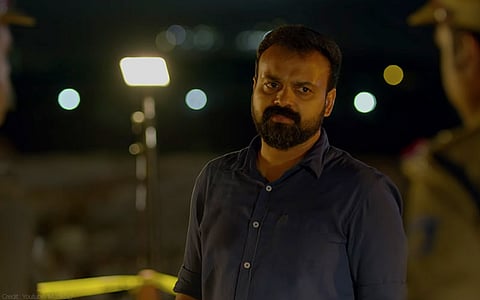
- Reviews
- Power List 2024
- Cannes 2024
- In-Depth Stories
- Web Stories
- News
- FC Lists
- Interviews
- Features
- FC SpecialsFC Specials

Director: Midhun Manuel Thomas
Cast: Kunchacko Boban, Unnimaya Prasad, Jinu Joseph, Remya Nambeesan, Sreenath Bhasi
Anwar Hussain (Kunchacko Boban) is not Sherlock Holmes who uses deduction to solve crimes. Instead, he is GK Chesterton's Father Brown, who uses his intuition and keen knowledge of human nature. Anwar is a psychologist who specialises in criminal behavior. For him, studying crime is an opportunity for psychological analysis. As a character in death row puts it to him, crime is all about the "ecstasy", the psychological high experienced by the criminal.
Anwar consults with the police department, and his first case with them is a series of murders in which policemen themselves are the victims. A team headed by Deputy Commissioner Maria (Unnimaya Prasad) fumbles with the case until, with Anwar's help, they gradually identify the criminal. In an early scene at the location of a crime, a shot shows Anwar looking at the body of a victim. The next shot (showing Anwar's point of view) is not a closeup shot of the victim or the wounds, but instead a high-angle shot of the victim lying inside a security cordon. Anwar takes in the crime scene as a whole, including the possible motives behind it, not merely specific forensic details.
The film is unapologetically on the side of psychological analysis and indifferent to moralizing
But, the criminal is not just interested in murder. He engages in a cat-and-mouse game with the cops and leaves clues. Mind games are a theme here. Anwar tries to find a pattern in the murders, because he wants to figure out the criminal and prevent the next murder. A not-so-ethical hacker (Sreenath Bhasi, who is hilarious in the film) sees his involvement in the case as yet another game between the criminal and him.
What begins as a taut thriller slackens midway when DCP Maria is taken off the case. Anwar has to battle two challenges now: new murders and convincing the new officer that he can be useful. There's a bit of drama along with the detective work. Things slow down further during a flashback but the emotions don't register, because we have been conditioned so far to look at events analytically. The lull allows one to be distracted by logical questions. How is Anwar taken by the police to an encounter when he is just a consultant with the department? What is the point of the decoy murders by the criminal? We get that he is playing a game, but the intelligence involved in these games decreases as the film progresses. The initially heightening tension, enhanced by a superb background score by Sushin Shyam, now falls due to the predictability.
Investment in the criminal's backstory pays off in an affecting scene at the end when the person who was morally responsible for the crimes is punished
The usual thriller tropes are executed inventively. You have identical murders, but with an exception. The clever explanation worked out by Anwar is satisfying, and also explains the exception. There is the expected change of guard in the investigation team as it nears the criminal, but eventually this turns out to be for the good. Anwar lectures his students about criminal behavior in a way that foreshadows events, but there's a solid and unexpected twist buried in all the information.
The film is unapologetically on the side of psychological analysis and indifferent to moralising. The only ambiguous stretch is when it tries to counterpoint Anwar's logical investigation with an emotional apology for the criminal in the flashback. Yet, investment in the criminal's backstory pays off in an affecting scene at the end when the person who was morally responsible for the crimes is punished.
Consistent with its premise, the film ends not with Anwar's triumph, but with him noticing that he had failed to analyse an important aspect of the case. The film, like Anwar himself, is not really looking for solutions to crimes. Instead, it tries to understand the minds of those who commit these crimes.